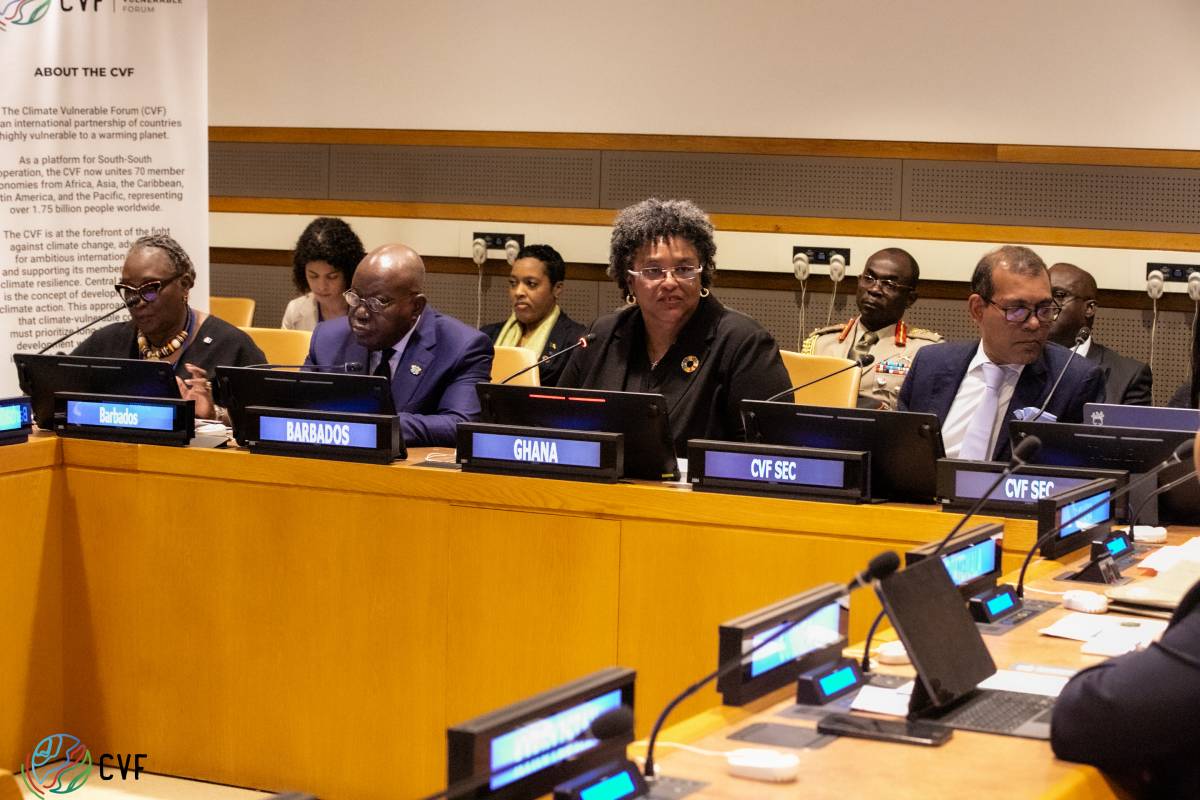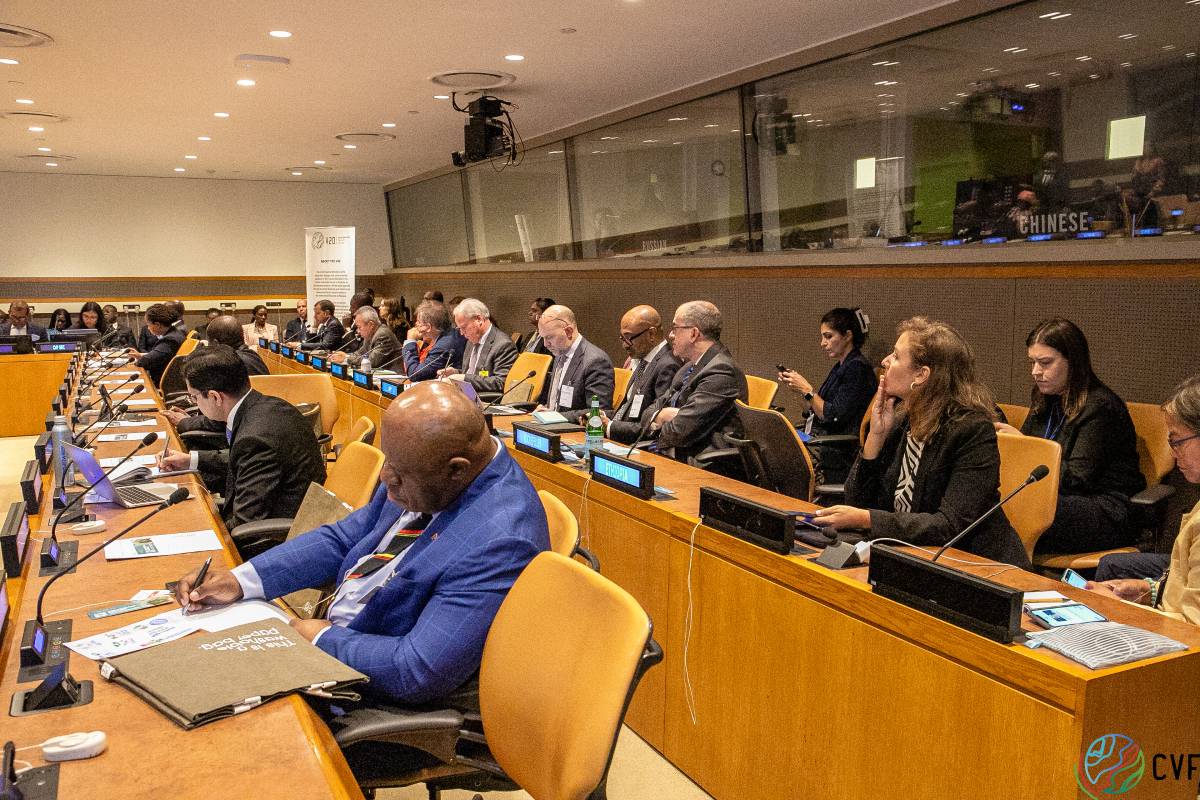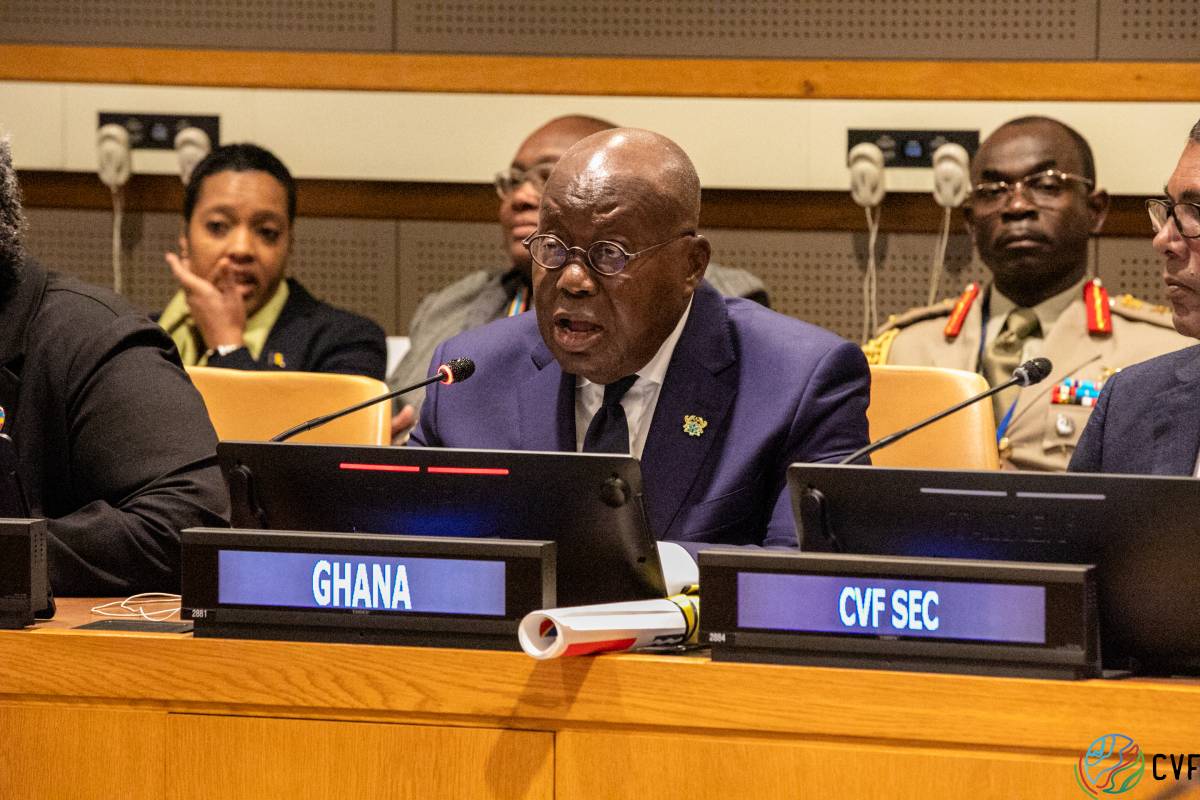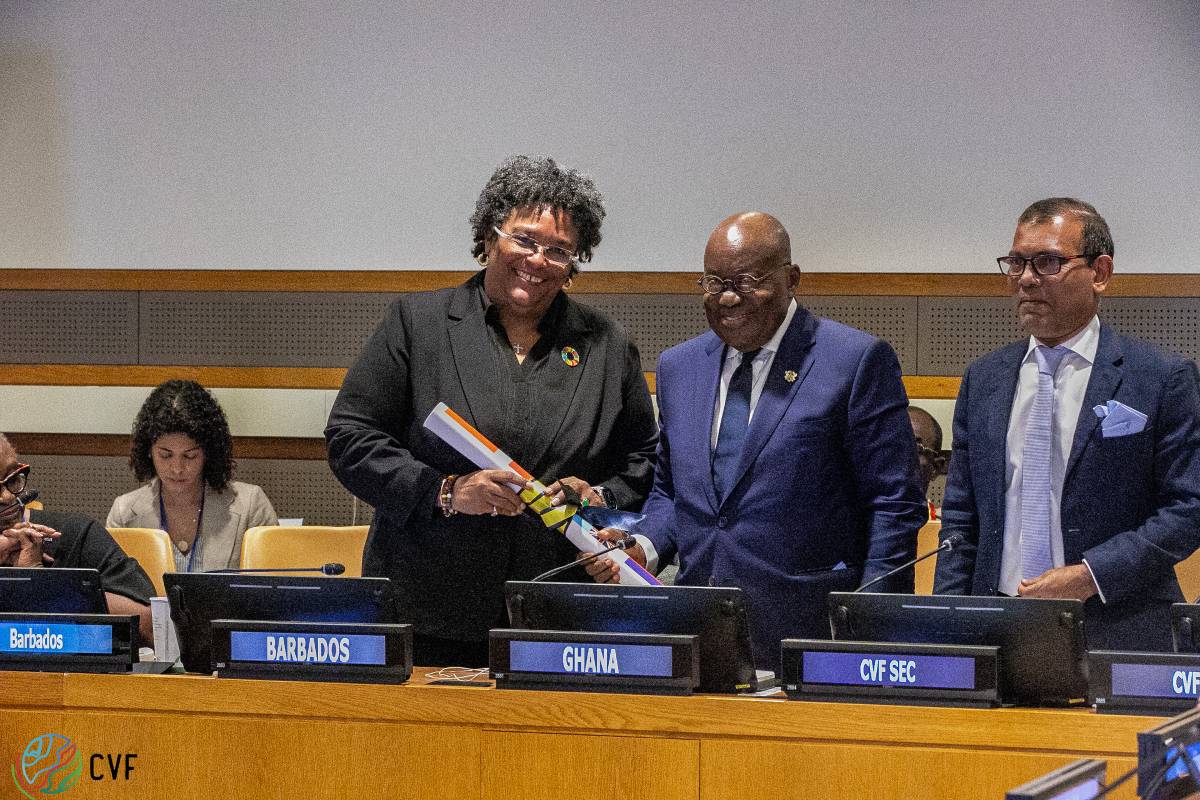Barbados Prime Minister Mottley accepts the Chair from Ghana President Nana Akufo-Addo at UN ceremony in New York
25th September, 2024, NEW YORK – Ghana’s President, Nana Addo Dankwa Akufo-Addo, today handed over the Presidency of the Climate Vulnerable Forum and V20 Finance Ministers (CVF-V20) to Prime Minister of Barbados, Hon. Mia Amor Mottley.
The baton was passed during a ceremony at the United Nations headquarters marking the end of Ghana’s two-year tenure as Chair of CVF-V20 and the beginning of the CVF’s first Caribbean leadership. The CVF-V20 Presidency rotates every two years.
The Climate Vulnerable Forum represents 68 climate-vulnerable developing countries, including many African nations, small islands and least-developed countries. Collectively its members comprise over 1.74 billion people, a fifth of the world’s population. The CVF advocates for ambitious global climate action, and rapid clean energy development – termed ‘climate prosperity’ – for its members.
Ghana’s presidency saw major institutional progress within the CVF-V20. Now an official intergovernmental entity, its membership increased from 58 to 68 countries. A permanent independent Secretariat was established, with a headquarters in Ghana’s capital Accra, to administer the organization, led by the new position of Secretary-General Mohamed Nasheed, former president of Maldives.
The handover comes at a time when many of the CVF’s members are struggling under huge debt burdens, while a shortage in the supply of affordable capital for climate action projects are keeping countries locked into non-resilient infrastructure and damaging fossil fuels.
Ghana’s President Nana Akufo-Addo said: “We must call for substantial capital increases in the multilateral development banks to unlock the investments necessary for green infrastructure and sustainable development. But capital alone is not enough. We need concessional capital—financing on terms that are fair and that reflect the unique challenges faced by climate vulnerable nations.”
Prime Minister Mottley said Barbados will focus their Presidency of the CVF-V20 on the debt burden and cost of capital experienced by developing countries, the multiple impacts of the climate crisis on the development prospects of the CVF’s member-states, and the increasing adverse consequences of climate change on human health and the implications for health care systems and budgets. Attention will also be paid to securing accessible financing for sustainable development, climate-resilient economic growth, and reforming the global financial system to support climate action.
Prime Minister Mottley thanked Ghana’s President for his country’s stewardship of the CVF V20 and emphasized that the greatest strength of the organization is the unity of its members and stated her ongoing commitment to offering a ready ear to the membership’s concerns and ambitions. The Prime Minister also highlighted her intent to work assiduously to build on the efforts that have led the organisation to its current position.
CVF Secretary-General Mohamed Nasheed, former President of the Maldives, said: “I’m proud to be the first secretary-general of the newly independent Climate Vulnerable Forum, and I will do my utmost to ensure the needs of our 1.7 billion people are not ignored. We are the voice of the vulnerable, and we will be heard.”
CVF-V20 Leaders Champion a Bold Declaration for Global Action
During the event in New York, leaders of the CVF-V20’s member countries signed a declaration calling for the urgent revamp of the international financial architecture and for greater representation of CVF countries within the financial reform agenda. In 2023, net outflows from Emerging and Developing Countries surged to nearly USD 200 billion due to private creditor repayments, while international financial institutions withdrew USD 40 billion in non-concessional capital. This has led to severe cuts in health, education, and infrastructure spending amid widespread famine in climate-vulnerable regions.
CVF-V20 is leading global efforts to improve access to concessional capital and establish implementation arrangements that prioritize strengthening national institutions, and drastically improved debt strategies tailored to enable climate-vulnerable countries to address climate and debt jointly. The declaration also stressed the need for a more responsive, fairer, and inclusive global financial system starting with governance. Critical to this goal is CVF’s attainment of Observer status in the United Nations, recognition as an official intergovernmental group in the Bretton Woods Institutions, and official inclusion of V20 as an Observer in the G20’s International Financial Architecture Working Group.
Noting its link to reduced debt service due to lower physical risk, the CVF also called for the rapid and comprehensive valuation of natural capital and biodiversity assets to be reflected on national balance sheets.
The CVF also looks forward to progress in the International Maritime Organization on a maritime GHG emission pricing mechanism that ensures a 1.5°C transition and mobilizes sufficient resources to ensure a just and equitable transition for CVF members. According to the World Bank, with entry prices starting at $150 per tonne of CO2e, upwards of $60 billion of financing can be raised to support existing climate action.
The CVF recognizes the New Collective Quantified Goal (NCQG) as a pivotal opportunity to overcome the limited scope of the $100 billion target. While delivery of finance at a scale reflective of Paris ambition is more urgent than ever, the NCQG must likewise reflect ambition as trackable and actionable finance directly connecting with ongoing reforms, enhancing accountability in the international financial system, and addressing cost of capital, debt instability, and loss and damage comprehensively.
The CVF-V20 also welcomed two new members during the Leaders’ Meeting, Suriname and Nauru, raising the membership from 68 to 70 members.
About CVF-V20:
The CVF-V20 represents 70 member-countries from small island developing states (SIDS), least developed countries (LDCs), low-to-middle income countries (LMICs), landlocked developing countries (LLDCs), and fragile and conflict-affected states (FCS). Working together, the CVF-V20 aims to achieve climate justice through the realization of Climate Prosperity Plans, which contain ambitious economic and financial resilience strategies designed to attract investment and resources that advance the attainment of the Sustainable Development Goals, 30×30 Global Biodiversity, and help keep the average global temperatures to the Paris Agreement’s 1.5°C safety threshold.
Contact:
For media enquiries, please contact us at [email protected]
For the latest updates on the CVF and V20, please follow us on X at: @TheCVF, @V20Group
Africa: Benin, Burkina Faso, Chad, Comoros, Côte d’Ivoire, Democratic Republic of the Congo, Eswatini, Ethiopia, The Gambia, Ghana (Chair), Guinea, Kenya, Liberia, Madagascar, Malawi, Morocco, Mozambique, Namibia, Niger, Rwanda, Senegal, Sierra Leone, South Sudan, Sudan Tanzania, Togo, Tunisia, Uganda
Asia: Afghanistan, Bangladesh, Bhutan, Cambodia, Kyrgyzstan, Maldives. Mongolia, Nepal, Pakistan, Philippines, Sri Lanka, Timor-Leste, Vietnam
Caribbean: Barbados, Dominica, Dominican Republic, Grenada, Guyana, Haiti, Saint Lucia, Trinidad and Tobago
Latin America: Colombia, Costa Rica, Guatemala, Honduras, Nicaragua, Paraguay Middle East: Jordan*, Lebanon, Palestine**, Yemen
Pacific: Fiji, Kiribati, Marshall Islands, Palau, Papua New Guinea, Samoa, Tonga, Tuvalu, Vanuatu
Incoming Members: Suriname, Nauru
*Formalization pending further discussions
**As a UN non-member observer state
To view the complete event, please visit: https://webtv.un.org/en/asset/k1l/k1ljm9mmxz
Download CVF Leaders Declaration September 2024




